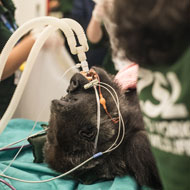
Effie had eight inches of infected bowel removed
London Zoo veterinary surgeons performed life-saving surgery on a 200lb western lowland gorilla who was suffering from a bowel infection.
Vets spent four hours operating on the gorilla, removing eight inches of infected bowel, which is likely to have been caused by trapped food in her digestive system.
Prior to the surgery, keepers had noticed 24-year-old Effie had lost her appetite and was spending more time away from the other gorillas.
“After a few days of refusing her favourite foods it was clear there was something really wrong with Effie,” said ZSL vet Amanda Guthrie. “So we worked with her keepers to perform an ultrasound examination. Once we saw the problem we decided it was best to operate on her that day.”
Effie is recovering well from her surgery, which took place on 29 December, and is now back with her family in the zoo’s Gorilla Kingdom.
“We’re really pleased with how well Effie is recovering from her recent surgery,” Amanda added. “Her keepers and the ZSL vet team have been keeping a close eye on her and are happy to report that she’s back to her usual self, eating her favourite treats again and playing with Gernot [her two-year-old son].”
Western lowland gorillas are classed as critically endangered on the IUCN Red List of Threatened Species. According to WWF, the species has plummeted by more than 60 per cent over the past 20-25 years, as a result of poaching and disease. It is thought that even if all threats were removed, the population would take 75 years to recover.
Image © ZSL London Zoo



 The Veterinary Medicines Directorate (VMD) is inviting applications from veterinary students to attend a one-week extramural studies (EMS) placement in July 2026.
The Veterinary Medicines Directorate (VMD) is inviting applications from veterinary students to attend a one-week extramural studies (EMS) placement in July 2026.